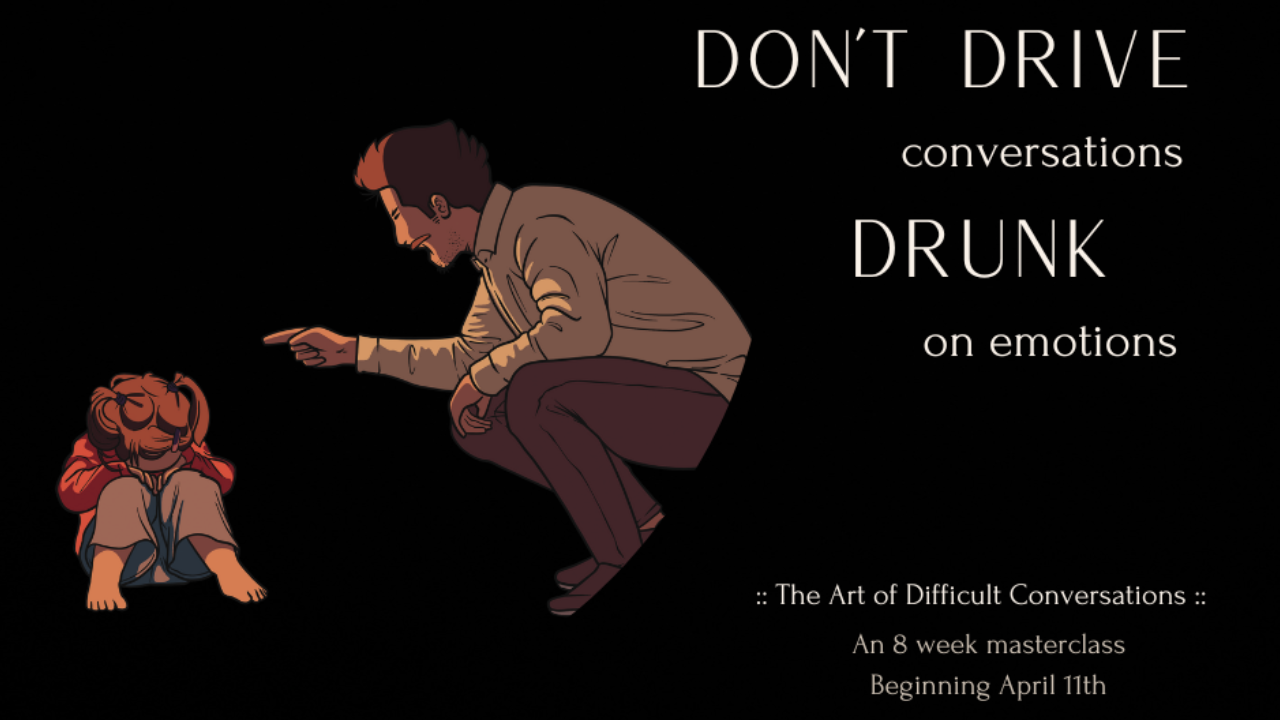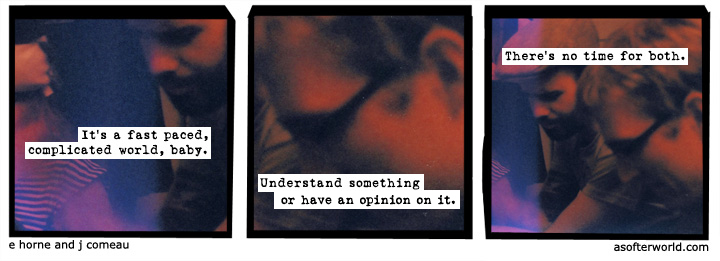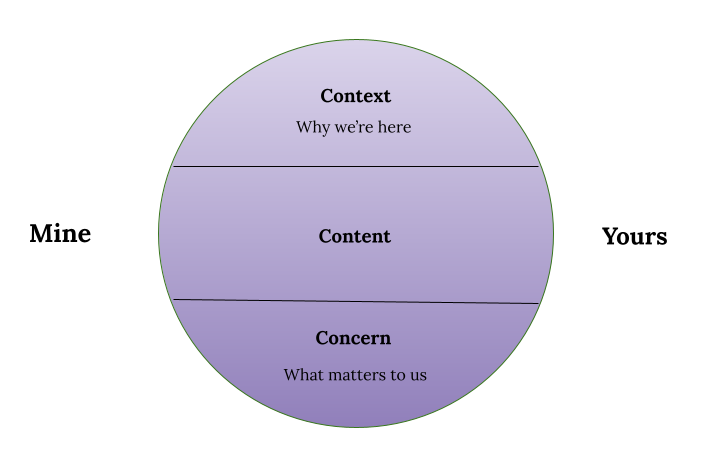Art of Difficult Conversations interview
Mar 27, 2023
On April 11th, we will be launching the next round of one of our favorite courses, The Art of Difficult Conversations. This is a original collaboration between Authentic Revolution and Alexander Beiner of Rebel Wisdom. Sara did a written interview with Megan Morrison of The Thriving Creator about the course. If you're interested, we'd love to have you join!
(P.S. A hallmark of the course is our use of relevant memes. We'd hate to deprive you of those in this post ;) )

Why does learning to have difficult conversations matter? So many people do just fine in life without training in this subject.
Our relationships are often "fine". We get along fine with our family; no major complaints, except that we can't talk with them about politics or polyamory or mental health. We get along fine with our partners, except that we're annoyed at some of the things they do but don't want to rock the boat by talking about it. Who cares if we watch TV every night instead of inspiring each other with poetry? We're fine, right?
If you can't tell, I'm a stand for good, great, or transformative over fine. Difficult topics are like a dam in the stream of our relationships. Over time, they can stop the flow of energy. We start to avoid other people or parts of who they are, and the dam gets increasingly hard to take down as the energy builds up behind it. We think that breaking it now might overwhelm our relationship with this person. But not breaking it is limiting the amount of aliveness, clarity, and authenticity that is allowed to flow.
Courses like the Art of Difficult Conversations give tools for having these conversations in a way that won't break the relationship. That will allow us to create chinks in the dam, both from our side and theirs, and start the energy flowing again. With that energy comes aliveness, and aliveness is what makes us better than fine.
What's one tool or distinction you share that typically leads to an "ah-ha!" Moment for students in this course?
One of the major models we teach is something I call "Context, content, and concern". When we talk with each other, the Content is what we are saying. The Concern is what feelings, needs, values, and motivations underlie that Content. And the Context is what we believe to be true, either about each other, ourselves, or about the world. It's like the spectacles through which we see.

So, for instance, I might have a conversation with my family at the dinner table about politics. Although we're speaking supposedly about what we've read and what we believe, underneath this Content are Concerns like, "If I get convinced by my daughter and change my beliefs about Y, will I lose my friend group?" and "If I start thinking that Y is good, it might invalidate the pain I experienced in this one situation where Y happened." We begin to argue about whether Y is good or bad, without actually realizing that for Mom to change her belief she'd have to risk ostracism, and for you to change your belief, you'd have to lay aside a lot of pain. Looking for and speaking to the concerns is a really powerful tool for resolving entrenched issues.
Context is another part of this tool, and one that rarely gets talked about. Perhaps the dinner table is actually a really bad Context to discuss these issues, because your mom has clear beliefs (Contexts) about what should and shouldn't be discussed at the dinner table. By bringing up politics, you're acting against her norms, and she's already triggered before you even share a view. You could ameliorate this by choosing a Context like a 1:1 conversation with her over tea.
There is so much more to this, and so many other tools we'll cover. But that is one that many students have found powerful.
You said this is one of the most powerful courses you've ever taught. Why do you think that is?
I think that most people aren't ever taught tools for having difficult conversations. We think (and I used to share this view, years ago) that we either have the conversation and break the relationship, or we don't have the conversation and preserve the relationship. With that choice, who would decide to have the conversation, unless the relationship is already at a breaking point? One of my teachers used to say, "We only really get honest when something is dying - a person or a relationship."
It turns out that having conversations we've been putting off, or have labeled as "not that important", in ways that create a positive result, really improves people's lives. It brings energy back into stagnant relationships. It helps teams get more creative. It gets people raises, promotions, engagements, disengagements, out of abuse, into better lives. It decreases the net amount of polarization and pain in the world. I don't think there is anything more powerful than that.
I don't consider myself an expert in having difficult conversations - that would be like calling myself an expert in all the diverse practices of psychology. But, what I and my co-teacher Geof have learned and researched seems to have really helped our students to have some of the toughest conversations in their lives.
What are three common mistake you see people make with difficult conversations? How do you address them in the course?
One: Thinking that one conversation can change a relationship, and that they need to get that conversation RIGHT if they're going to have it. Two: Having conversations in a wrong/not ideal context. Three: Not paying attention to the power dynamics in an interaction, and thus inadvertently dooming their cause.
For one, we help students develop relationships instead of conversations. We host Difficult Conversations Labs throughout the course, in addition to the main sessions, where you can actually practice conversations before you have them, so you don't have to get it right the first time. And we encourage slow progress with weekly suggestions and assignments on how to move forwards.
For two, we teach how to have what we call "Opt-In" conversations (where you can choose the ideal setting, set the context in advance, and give the other person(s) a choice over whether or not to join) versus "Opt Out" conversations, where the person(s) get put on the spot to respond to a difficult conversation. That usually doesn't go as well.
For three, we cover a model of "Power, Status, and Authority" to break down how power dynamics affect conversations. How, for instance, having a conversation with a high-status individual can go badly if you're asserting authority but don't have status. Or why having resource power doesn't necessarily mean people have to listen to you. The fact is - though we don't like to think this way - that if you have no power in an interaction, you can never force someone who doesn't want to listen to you to care what you think.
What are three important things to remember when you're about to have a difficult conversation?
One: Slow down. Never have a conversation from an escalated place. 9 times out of 10 it won't go well, and the 10th time, it probably went well only because the other person dissociated. Don't drive the conversation while drunk on anger.
Two, you're not the only one with something at stake. Think through why the other person might be feeling defensive, why they might be holding their point of view. What's at stake for them if they capitulate? Consider their Concerns and the conversation will go WAY better.
Three, know your own Concerns. If you're upset but you don't know WHY you're upset - what is threatened, what is at stake, what values of yours have been compromised, what do you actually want here - you might win the argument but lose the war. If you don't know what you want, and what ground you're willing to give, you'll stick to the little points at the expense of your true needs.
If you found this interesting, join us for the next Art of Difficult Conversations course! 8 weeks of in-depth content with recorded sessions plus Difficult Conversations Labs, AND a 40-page workbook - all for less than $400, with scholarship options.
The Art of Difficult Conversations
See you there!
Sara
Lorem ipsum dolor sit amet, consectetur adipiscing elit. Cras sed sapien quam. Sed dapibus est id enim facilisis, at posuere turpis adipiscing. Quisque sit amet dui dui.
Stay connected with news and updates!
Join our mailing list to receive the latest news and updates from our team.
Don't worry, your information will not be shared.
We hate SPAM. We will never sell your information, for any reason.




